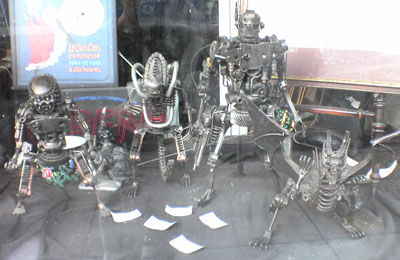Older blog entries
Talk about age discrimination. Older posts are the bane of blogs because (1) they virtually become invisible when they move off the home page and (2) they are the targets of almost all comment and trackback spam. And yet, and yet, we love them. We need to link back to them and bring them into more current discussions.
So, I appeal to you, blog readers, to help me with something that should be simple. I want to create an “Older Entries” link at the bottom of the home page that takes you back a few weeks sequentially so that you can continue reading after the cutoff point for posts on the main page. On these pages you could conceivably go “forward” again in time. I’ve seen this functionality on various blogs but I’m not sure how to do it in Movable Type. Gotta be a simple tag, archive template, or plugin, no?
Escher streetscape
Last year I wrote about running to the lake just ahead of the street-by-street drawbridge openings. I thought it’d be a fun thing to do with kids so yesterday we did the reverse. Being fall, the boats were all coming back in for winter docking and we were poised at 9AM at the Lake Shore Drive bridge. Up it went and in they came as we raced the stroller against the boats to the next bridge westward. That one — Columbus Ave., the largest movable bridge on the river system — was fun since you can actually stand on the shore path underneath as it heaves upwards. You’d probably not be surprised by how much crud comes raining down when you are standing right next to the base of the bridge fulcrum, though I’d wager you wouldn’t think of it until the last second. We had to huddle underneath the double-stroller’s sunshade to hide from the pummelling of street detritus: dirt, pebbles, cigarette butts, and other things probably left best unconsidered.

Only 18 boats at a time can be let up the river because of limited idling space between the bridges in the loop. That makes for a hectic season for the CDOT. Still, there’s nothing quite as cool as the sight of three consecutive bridges going up — except maybe watching the mix of horror and exhiliration on the face of a four-year-old who thinks the roadway is going to topple straight over on him.
Disruption to traffic? Of course! But well-heeled yacht-owners have rights too and since the the Chicago River is a federal waterway Da Mayor ain’t got no say.
iPod concerns
Dear Apple, I have some questions for you.
First, did you just break every gadgety add-on ever created for the iPod by removing the extended headphone port at the top? I’m not sure who you’ve pissed off more, your customers or companies like Belkin and Griffin. (Update: if that doesn’t irk ’em, this will.)
Also, what the !@$%&? happened to the 80GB iPod? We know you bought the big hard drives from Toshiba. What are you using them for?
Lastly, so you’re giving us rights-managed video and disallowing us from burning to CD/DVD? Must we submit a urine sample too?
C’mon, give me some love here! Please. I want to give you more of my money, but you are not making it easy.
Your friend,
John
PS – Front Row only for new iMacs? You think we PowerMac owners didn’t need this about two years ago?
Roar in the Gobi
China launched its second manned spaceflight today. The Shenzhou VI capsule carried two astroanauts (taikonaut is the word used previously, though I’m not seeing it employed this time around) and much-improved living quarters into orbit a few hours ago for a 5-7 day trip around the Earth. A module attached to the capsule itself will be left in space, presumably as some kind of remote-controlled lab, but details are vague. Vagueness is typical of the Chinese space program, but my colleagues in Beijing confirm that the launch itself was a big news event, broadcast live on state TV. That’s progress. The first launch — like the first Soviet launches so long ago — was kept a secret until the capsule was safely in orbit.
A light snow was falling at liftoff, reports say. I’d like to see a picture of that. There’s something about a light blanketting of snow preceding the cataclysm of a rocket launch that’s pleasantly odd, almost like a Photoshopped image.
One wonders if this launch was actually delayed since last week the People’s Republic celebrated National Day and a launch event, source of such national pride, would have made sense then. If it was delayed this is a good sign that China has their launch priorities in line. Perhaps they’ve learned from the close-calls the early Soviet space program had in trying to launch in conjunction with politically-significant events.
The long march to the moon continues.
Lunar threepeat
Tom Hanks has a thing about the Apollo program. I suppose you could say I do too. I’ve been interested in NASA and spaceflight since I was young, but what really what set me on my current path of obsession was the Hanks-produced and -introduced HBO mini-series From The Earth To The Moon from 1998. It was extraordinary television, dramatic and intelligent. Only after that did I dive into Apollo 13 in earnest. It was one of the first DVD’s I ever owned and it still is the benchmark with which I test new AV gear at home. (Pay attention to the surround sound field as the camera pans along the fuel pipes just before liftoff.) I treated Apollo 13 as a kind of alternate chapter to From The Earth To The Moon, even though the film preceded the mini-series by three years.
So, Hanks is back at it with Magnificent Desolation: Walking on the Moon 3D, an IMAX 3D short film. Like most IMAX it is a temporary fun, not exactly satisfying after the fact. Add in the 3D glasses — something I have not worn since Jaws 3D in the 1980’s I’m pretty sure — and you have enough gimmicks to truly stack the deck against the show. You really can’t tell the story of Apollo in 55 minutes and you certainly don’t have elbow room for narrative arcs so what Magnificent Desolation aims for is merely to make you feel like you are walking on the moon. This it achieves. My four-year-old was reaching out to grab the moondust that was kicked out into the audience via 3D. The best effect was the now-typical pan way out (ala Titanic) from the lander to a very broad shot of just how alone the astronauts actually were, not a shot that any Apollo-era photo could ever provide. The only aspect of drama in the whole thing was a play off this loneliness where they enacted an emergency scenario, thankfully never used in six moon landings, where the astronauts were stranded after a rover malfunction kilometers from the lander. One of the astronaut’s oxygen was low and they had to hoof it back to home so they buddy-breathed their way back to spacecraft. It was very well done, but the whole time I was thinking that when we do go back to the moon (and by “we” I guess I mean the Chinese) it will be a hell of a lot easier to fake a moon landing than Capricorn One. We won’t even need O.J. Simpson.
In the end it was satisfying, but only in the way that an amusement park ride is. Cheap thrill, go home, forget about it — except to blog it. The show interspersed a bunch of actual footage of the landings, but because of the resolution difference — 1960’s-era film versus six stories of IMAX screen — meant that the footage was shown picture-in-picture as a small overlay. This will be the fate of so much pre-HD footage in the future, jarring you out of the experience merely because the effect is so low-res.
Magnifcent Desolation had a bit of an agenda too. They interviewed kids to see what they knew, mostly focusing on what they didn’t, about the Apollo program. One child, a young latina, said she’d love to go to the moon. Her story and her crayon drawing of how she would get there was dramatized at the very end in a future scenario where said child was the commander of an extensive moon base, making ample reference to the fact that humans have not stepped foot on our satellite in over thirty years. It won’t change the fact that there is no public will to do this any time soon, but it was powerful nonetheless.
So, I recommend this if you can see it in an IMAX theater. If not, the DVD will underwhelm. Sorta like saying, if you can buy a ride to orbit, do it. Otherwise, wait for the movie.
The always-ending story
My two-year-old refers to books as “the end”. Sing-songy, up-down. “The end.” If he wants a book he will point to it and say “the end”. Walking down the aisles of a bookstore a few weekends ago was an endless parade of “the end, the end, the end.”
In addition to being cute, this is also useful since ending a story — and being able to say “the end” — is the best part for him. So you never have to worry if you’re not up for reading a longish story. Just quickly proceed to “the end.”
However, I’m not sure he’ll be as interested in the looping, sometimes endless hypertext fiction as I am.
The end.
Reason: none
I have come to believe that the harder a company has to fight for customers the worse they treat those customers. Take cellular providers, a business with a high degree of customer turnover and which faces intense competition from rivals.
So I was screwing around with the data services on my Cingular phone yesterday. I noticed a thing called MobiTV which promised television broadcasts to the phone. Three day free trial. As is typical for non customer-focused initiatives like this, if you do not cancel in three days you will be billed. Oh and of course, unlike signing up, you cannot cancel via the phone. Well the service stunk. The video was jerky and pixellated as you’d expect for a non-3G network.
Great, so how do I cancel? Online, OK. First three tries, server error. When I finally got through I found that I was in fact charged $10 for the free trial. Now I’m not a linguist or an economist, but there’s something that seems, well, not free about a $10 charge. Anyway, there was a form to request a refund. Indignation rising — why the hell should I have to challenge a charge from a free trial? — I submitted the form, dutifully filling out the “Why are you requesting a refund?” text box. I refrained from using profanity.
That is, until the next screen informed me that my refund request had been denied because I had exceeded the refund limit and that I had to call customer service. Let the cursing begin! Actually I started the call composed, explaining that I thought it not terribly customer-friendly to make us jump through such hoops to cancel. The support representative, clearly a jaded, shrivelled, flourescently-tanned troll of a human being, informed me that I could not request a refund for a charge that had not yet hit my bill. She was, in essence, saying that I had to wait for the next billing cycle — which would clearly throw me over the three day “free” preiod — and then call in to ask for a refund. Insanity. I explained the illogic as clearly as I could and then she put me on hold for 15 minutes to run to a supervisor.
Do you know what she told me when she returned? I’m sorry, sir, the reason your refund request was rejected was because you need to select “none” in the “Why are you requesting a refund?” box. What the fuck?! Ah, yes, Cingular: where you only get a refund if you refuse to state why you want one. Makes perfect sense. GRRR!
Is there any cellular service provider that actually puts the customer experience first? No, really. I cannot continue to pay these people money.
Happy holidays
Rosh Hashanah, Ramadan, and the Chinese National Day holiday all overlapped this week. Interesting trivia, except that my three main projects — One Voice (in Israel), Eternal Egypt, and somethin’ somethin’ going on in China — are all on hiatus. Wonderful, really.
But why the hell am I still so busy? Answer: all the stuff I never get to because of “real” work. If I had another week then I would really be living the life of leisure, but of course all holidays come to an end.
Motorcycle Giger
Interesting figurines of sci-fi movie characters made completely from motorcyle parts. Alien, Predator, Robocop, and Dragonheart. Full size at Flickr.
(Shop near Lincoln and Newport.)
Brothers in knob-twiddling
Mike and Marcus of Boards of Canada recently gave a great interview to Pitchfork where they revealed that there is an unreleased acoustic version of Music Has The Right To Children and — after an off-the-record pause to debate the point — admitted that they are, in fact, brothers. The reason for not publicly admitting it? They wanted to avoid comparisons to Orbital, another fraternal British electronica band — one that happens to occupy the same stratum of respect that I have for BoC.
So that got me wondering. Is there something about a brotherly relationship that leads to exceptional musical collaboration? Certainly there are many bands composed of family members, but specifically two brothers?
I’m not convinced this isn’t coincidence, but perhaps — perhaps — this has to do with the bedroom-studio nature of electronic music. That is, like most electronic music neither bands’ music requires elaborate studio setups or live recording. It is compact, home-brewed, and easily something that you’d be able to yell “hey, brother, come listen to this!” from the other room. This, as opposed to the rock band evolutionary culture that normally includes rockin’ out in a friend’s garage or at a party down the block. It’s less conducive to experimentation in the home and, maybe, less conducive to collaboration between brothers.
Who knows?














